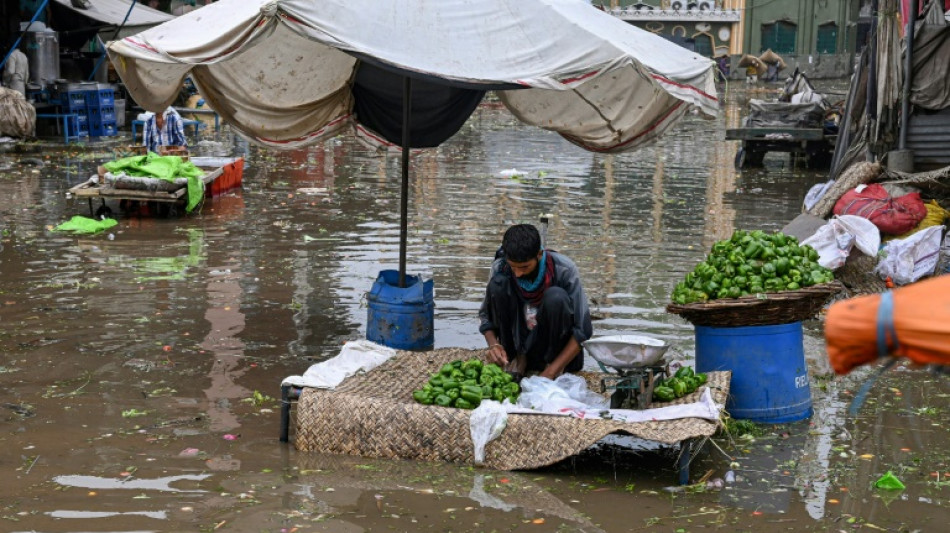
-
 Keys blows hot and cold before making Australian Open third round
Keys blows hot and cold before making Australian Open third round
-
Philippine journalist found guilty of terror financing

-
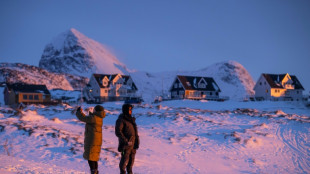 Greenlanders doubtful over Trump resolution
Greenlanders doubtful over Trump resolution
-
Real Madrid top football rich list as Liverpool surge

-
 'One Battle After Another,' 'Sinners' tipped to top Oscar noms
'One Battle After Another,' 'Sinners' tipped to top Oscar noms
-
Higher heating costs add to US affordability crunch
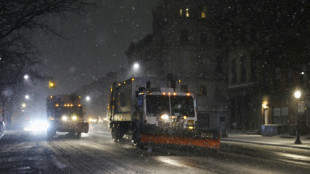
-
 Eight stadiums to host 2027 Rugby World Cup matches in Australia
Eight stadiums to host 2027 Rugby World Cup matches in Australia
-
Plastics everywhere, and the myth that made it possible
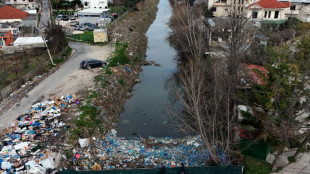
-
 Interim Venezuela leader to visit US
Interim Venezuela leader to visit US
-
Australia holds day of mourning for Bondi Beach shooting victims

-
 Liverpool cruise as Bayern reach Champions League last 16
Liverpool cruise as Bayern reach Champions League last 16
-
Fermin Lopez brace leads Barca to win at Slavia Prague

-
 Newcastle pounce on PSV errors to boost Champions League last-16 bid
Newcastle pounce on PSV errors to boost Champions League last-16 bid
-
Fermin Lopez brace hands Barca win at Slavia Prague

-
 Kane double fires Bayern into Champions League last 16
Kane double fires Bayern into Champions League last 16
-
Newcastle pounce on PSV errors to close in on Champions League last 16

-
 In Davos speech, Trump repeatedly refers to Greenland as 'Iceland'
In Davos speech, Trump repeatedly refers to Greenland as 'Iceland'
-
Liverpool see off Marseille to close on Champions League last 16

-
 Caicedo strikes late as Chelsea end Pafos resistance
Caicedo strikes late as Chelsea end Pafos resistance
-
US Republicans begin push to hold Clintons in contempt over Epstein

-
 Trump says agreed 'framework' for US deal over Greenland
Trump says agreed 'framework' for US deal over Greenland
-
Algeria's Zidane and Belghali banned over Nigeria AFCON scuffle

-
 Iran says 3,117 killed during protests, activists fear 'far higher' toll
Iran says 3,117 killed during protests, activists fear 'far higher' toll
-
Atletico frustrated in Champions League draw at Galatasaray

-
 Israel says struck Syria-Lebanon border crossings used by Hezbollah
Israel says struck Syria-Lebanon border crossings used by Hezbollah
-
Snapchat settles to avoid social media addiction trial

-
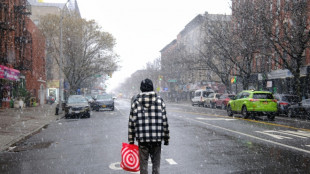 'Extreme cold': Winter storm forecast to slam huge expanse of US
'Extreme cold': Winter storm forecast to slam huge expanse of US
-
Jonathan Anderson reimagines aristocrats in second Dior Homme collection

-
 Former England rugby captain George to retire in 2027
Former England rugby captain George to retire in 2027
-
Israel launches wave of fresh strikes on Lebanon

-
 Ubisoft unveils details of big restructuring bet
Ubisoft unveils details of big restructuring bet
-
Abhishek fireworks help India beat New Zealand in T20 opener

-
 Huge lines, laughs and gasps as Trump lectures Davos elite
Huge lines, laughs and gasps as Trump lectures Davos elite
-
Trump rules out 'force' against Greenland but demands talks

-
 Stocks steadier as Trump rules out force to take Greenland
Stocks steadier as Trump rules out force to take Greenland
-
World's oldest cave art discovered in Indonesia

-
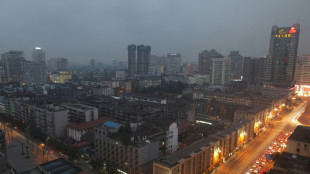 US hip-hop label Def Jam launches China division in Chengdu
US hip-hop label Def Jam launches China division in Chengdu
-
Dispersed Winter Olympics sites 'have added complexity': Coventry

-
 Man City players to refund fans after Bodo/Glimt debacle
Man City players to refund fans after Bodo/Glimt debacle
-
France's Lactalis recalls baby formula over toxin

-
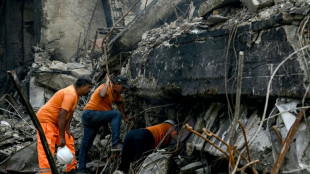 Pakistan rescuers scour blaze site for dozens missing
Pakistan rescuers scour blaze site for dozens missing
-
Keenan return to Irish squad boosts Farrell ahead of 6 Nations

-
 US Treasury chief accuses Fed chair of 'politicising' central bank
US Treasury chief accuses Fed chair of 'politicising' central bank
-
Trump rules out force against Greenland but demands 'immediate' talks

-
 Israeli strike kills three Gaza journalists including AFP freelancer
Israeli strike kills three Gaza journalists including AFP freelancer
-
US Congress targets Clintons in Epstein contempt fight

-
 Huge lines, laughs and gasps as Trump addresses Davos elites
Huge lines, laughs and gasps as Trump addresses Davos elites
-
Trump at Davos demands 'immediate' Greenland talks but rules out force

-
 Australia pauses for victims of Bondi Beach shooting
Australia pauses for victims of Bondi Beach shooting
-
Prince Harry says tabloid coverage felt like 'full blown stalking'


Every 1C of warming means 15% more extreme rain, researchers say
Global heating incrementally boosts the intensity of extreme rainfall at higher altitudes, putting two billion people living in or downstream from mountains at greater risk of floods and landslides, researchers said Wednesday.
Every degree Celsius of warming increases the density of major downpours by 15 percent at elevations above 2,000 metres, they reported in the journal Nature.
On top of that, each additional 1,000 metres of altitude adds another one percent of rainfall.
A world, in other words, 3C hotter than preindustrial levels will see the likelihood of potentially devastating deluges multiply by nearly half.
The findings underscore the vulnerability of infrastructure not designed to withstand extreme flooding events, the authors warned.
Earth's surface has already warmed 1.2C, enough to amplify record-breaking downpours that put huge swathes of Pakistan under water last summer, and parts of California earlier this year.
On current policy trends, the planet will warm 2.8C by century's end, according to the UN's IPCC climate science advisory panel.
The new study -- based on data covering the last 70 years, and climate-model projections -- found two main drivers behind the upsurge in extreme rainfall events at altitude in a warming world.
The first is simply more water: scientists have long known that every 1C increase boosts the amount of moisture in the atmosphere by seven percent.
- From snow to rain -
Since the 1950s, heavy rainfall has become more frequent and intense across most parts of the world, according to the World Weather Attribution (WWA) consortium, which teases out the impact of climate change on specific extreme weather events, including heatwaves, droughts and tropical storms.
Extreme rainfall is more common and intense because of human-caused climate change in Europe, most of Asia, central and eastern North America, and parts of South America, Africa and Australia, the WWA has found.
The second factor uncovered by researchers was more surprising.
"This is first time that anyone has looked at whether those intense precipitation events fall as rain or snow," lead author Mohammed Ombadi, a researcher at Lawrence Berkeley National Laboratory in California, told AFP.
"Unlike snowfall, rainfall triggers runoff more rapidly, leading to a higher risk of flooding, landslide hazards and soil erosion."
Ombadi speculated that a higher rate of snow-turned-to-rain observed between 2,500 and 3,000 metres was due to precipitation at that altitude occurring a just below freezing.
The mountainous regions and adjacent flood plains likely to experience the biggest impacts from extreme rainfall events are in and around the Himalayas and North America's Pacific mountain ranges, according to the study.
The findings focused only on the northern hemisphere due to a lack of observational data from below the equator.
The regions most affected should prepare "robust climate adaptation plans," the authors said.
"We need to consider this increase in rainfall extremes in the design and building of dams, highways, railroads and other infrastructure if we want to make sure they will remain sustainable in a warmer climate," said Ombadi.
High-risk areas will either need to be avoided altogether, or built up with engineering solutions that can protect the communities living there, he added.
J.Horn--BTB




